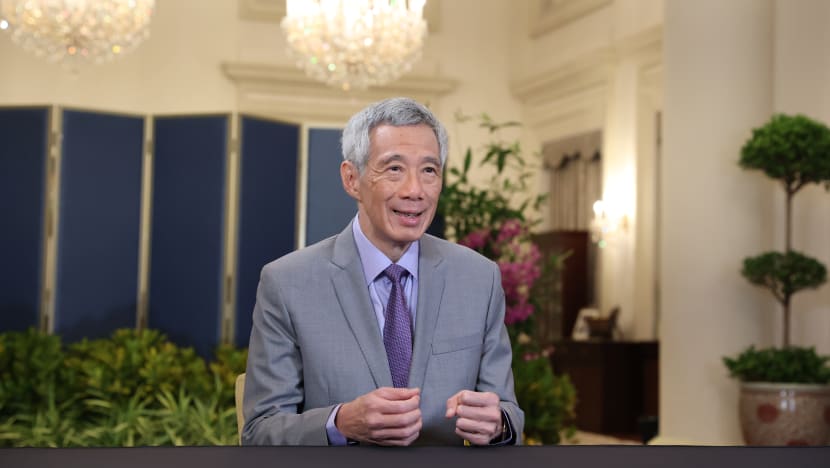PM Lee urges APEC members to deepen economic integration in digital domain

Singapore Prime Minister Lee Hsien Loong. (Photo: Ministry of Communications and Information)
SINGAPORE: Prime Minister Lee Hsien Loong on Thursday (Nov 11) urged members of the Asia-Pacific Economic Cooperation (APEC) to deepen economic integration in the digital domain, saying that this will help businesses connect more easily across borders and reach new markets in the digital economy.
“It is timely to extend this vision of regional economic integration to the digital domain,” Mr Lee said in a pre-recorded keynote speech streamed at this year’s APEC CEO Summit.
“To enhance our cooperation in the digital economy, APEC members should work towards a regional digital economy agreement or partnership agreement.”
The two-day summit is being held virtually and will be attended by political leaders, CEOs and thought leaders of APEC economies. APEC is made up of 21 members, with the cooperative process predominantly concerned with trade and economic issues.
Mr Lee’s comments come as the COVID-19 pandemic has quickened the adoption of digital technologies, with technology transforming cross-border trade and payments.
Within Southeast Asia alone, the Internet economy is projected to triple in size by 2025 to more than US$300 billion per year, said Mr Lee, pointing to the “huge” potential of the digital economy.
While trade agreements such as the Regional Comprehensive Economic Partnership (RCEP) have set out some rules to facilitate e-commerce, Mr Lee said, focused digital economy agreements would “carry this further”.
“They provide reference points on the common frameworks and rules for digital trade, including emerging technologies and data innovation,” he said.
Some APEC members have already concluded such agreements, Mr Lee said, highlighting the Digital Economy Partnership Agreement (DEPA) between Chile, New Zealand and Singapore and how more APEC economies have recently expressed interest in it.
“This is useful as a possible building block towards a larger regional or global architecture,” he said.
Mr Lee said APEC members can expand the existing DEPA or develop a new agreement with an expanded membership. This will create a “new dimension of economic integration”, he said.
Association of Southeast Asian Nations (ASEAN) member economies are already taking early steps to do so, Mr Lee said, referring to the ASEAN Smart Cities Network online portal where cities can share best practices in new growth areas such as digitalisation.
“All these are useful mechanisms that can be adapted within a broader regional context,” he added.
Globally, said Mr Lee, there also needs to be a “coherent and concerted” response to manage the digital transition, amid a widening gulf of opportunities between digital haves and have-nots.
For instance, the setting up of global digital standards and cooperation initiatives will enable more people to participate meaningfully in the digital economy, he said.
“There are many areas to consider, for example, fair and secure access to data, freer cross-border data flows, addressing misinformation and cyber threats, and strengthening multilateral cooperation to exploit digital technologies for sustainable development,” he said.
Related:
Mr Lee said the global digital architecture should serve to improve people’s daily lives, involve all stakeholders in the public and private sector, set norms in a multi-disciplinary way to address complex challenges, and identify a common set of digital development goals.
At the same time, the world needs to agree upon and implement effective multilateral rules in cybersecurity, Mr Lee said, noting that more digitalisation means more vulnerability to cyber threats.
“While each economy must strengthen our own cyber defences, we also need international ground rules, so that the digital world does not become an anarchic space subject only to the law of the jungle,” he said.
Mr Lee said Singapore actively engages the multi-stakeholder community to strengthen cybersecurity cooperation at the United Nations and other international forums.
For example, Singapore is hosting the ASEAN-Singapore Cybersecurity Centre of Excellence to strengthen regional cyber resilience, he said.
“Singapore will work closely with the international community towards not just an open and free digital environment, but also a secure and interoperable one,” he added.














